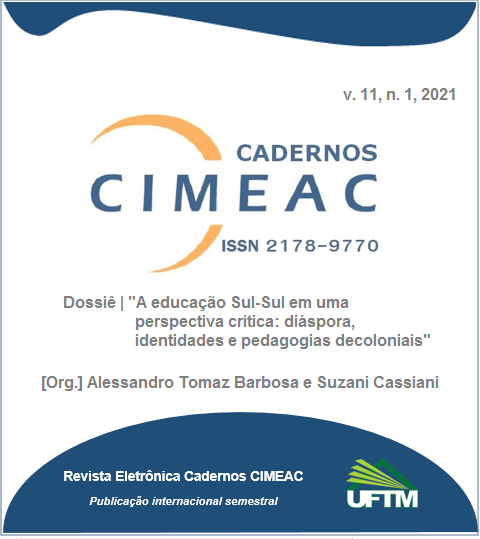A cooptação neocolonial da agência por meio da patologização da pobreza, da diversidade e da desigualdade nos EUA e como enfrentá-la com uma educação ativista transformadora
DOI:
https://doi.org/10.18554/cimeac.v11i1.5247Resumen
Este trabalho aborda a relação entre a patologização dos(as) estudantes oriundos(as) da classe trabalhadora, de imigrantes e de minorias étnico-raciais nos Estados Unidos e a cooptação da agência dessa população historicamente explorada e submetida a opressões sociais e educacionais. Para isso, utilizamos a concepção de agência desde o Posicionamento Ativista Transformador (Transformative Activist Stance – TAS), desenvolvido por Stetsenko (2017), a filosofia da práxis em Marx (1989), a teoria histórico-cultural de Vygotsky (2002) e a perspectiva anticolonialista de Freire (2019) e Quijano (2019). Primeiramente, apresentamos as condições de vida e de trabalho de estudantes vulneráveis e latinos(as) em Nova York e nos Estados Unidos, depois tratamos um conjunto de discussões teóricas oriundas de pesquisas sobre o contexto da patologização da pobreza, do déficit, da diferença e da desigualdade social. Em seguida, apresentamos as histórias de vida e de escolarização de estudantes do Community College da City University of New York (CUNY) diagnosticados(as) como deficientes de aprendizagem e a sua luta dentro do sistema educacional americano. O processo de patologização daqueles(as) que não se enquadram no padrão branco e supremacista norte-americano culmina numa nova forma de colonialismo (o Sul dentro do Norte Global), resultante na cooptação da agência crítica e transformadora daqueles(as) que, a priori, poderiam ser o motor da transformação do sistema escolar que os(as) oprime.
Palavras-chave: Neocolonialismo. Deficiência. Agência. Educação.
Abstract: This work addresses the relationship between the pathologization of students from the working class, immigrants and ethnic-racial minorities in the United States and the co-optation of the agency of this historically exploited population and subjected to social and educational oppression. For this, we used the concept of agency from the Transformative Activist Stance (TAS), developed by Stetsenko (2017), the philosophy of praxis in Marx (1989), the historical-cultural theory of Vygotsky (2002) and the anti-colonialist perspective of Freire (2019) and Quijano (2019). First, we present the living and working conditions of vulnerable students, especially Latinos, in New York and the United States, then we discuss a set of theoretical issues arising from research on the context of the pathologization of poverty, deficit, difference and social inequality. Next, we present the life and schooling histories 2 ? of students from a Community College at City University of New York (CUNY) diagnosed as learning disabled and their struggle within the American educational system. Our aim is to reveal how how the pathologization process produces students who come to “not fit in” the North American White supremacist sociocultural standard, which amounts to a new form of colonialism (the South within the Global North), resulting in the co-optation of the critical and transformative agency of precisely of the marginalized who, potentially, are uniquely positioned to be the engine of the transformation of the school system that oppresses them.
Keywords: Neocolonialism. Deficiency. Agency. Education.
Descargas
Publicado
Número
Sección
Licencia
Os autores que publicam nesta revista concordam com os seguintes termos:
(a) Não cobramos dos autores para a publicação neste periódico.
(b) Autores mantém os direitos autorais e concedem à revista o direito de primeira publicação, com o trabalho simultaneamente licenciado sob a Licença Creative Commons que permite o compartilhamento do trabalho com reconhecimento da autoria e publicação inicial nesta revista.
(c) Autores têm permissão e são estimulados a difundir e a distribuir a versão publicada de seu trabalho online (ex.: em repositórios institucionais ou na sua página pessoal) após o processo editorial, já que isso pode aumentar o impacto e a citação do trabalho publicado (Veja O Efeito do Acesso Livre).
* * *
AUTHORS COPYRIGHT AND PUBLISHING RIGHTS
Authors who publish with this journal agree to the following terms:
(a) This journal does not charge authors for publication.
(b) Authors retain copyright and grant the journal right of first publication with the work simultaneously licensed under a Creative Commons Attribution License that allows others to share the work with an acknowledgement of the work's authorship and initial publication in this journal.
(c) For authors whose articles have been accepted: authors are permitted and encouraged to post their work online (e.g., in institutional repositories or on their website) after the publication of the text in Cadernos CIMEAC, as it can lead to productive exchanges as well as earlier and greater citation of published work (See The Effect of Open Access).

 10.18554/cimeac
10.18554/cimeac

